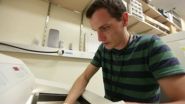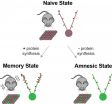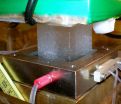(Press-News.org) AURORA, Colo. (May 28, 2015) - Researchers at the University of Colorado Anschutz Medical Campus have discovered a key molecular pathway that aids in the renewal of taste buds, a finding that may help cancer patients suffering from an altered sense of taste during treatment.
"Many cancer drugs, which circulate throughout the entire body, will target a tumor but in the process affect healthy cells," said the study's senior author Linda Barlow, PhD, professor of cell and developmental biology at CU Anschutz. "That in turn will alter a person's sense of taste leading to malnutrition, weight loss and sometimes death."
The study was published in the most recent edition of the journal PLOS Genetics.
Cancer patients, including those with colon and head and neck cancer, often experience significant alteration of their sense of taste during treatment with chemotherapy or radiation. Food may have no taste, a metallic taste or taste so bad that it's impossible to swallow.
"Taste dysfunction can...result from an alteration of the renewal capacities of taste buds and is often associated with psychological distress and malnutrition," said the study's lead author Dany Gaillard, PhD, an instructor in cell and developmental biology at CU Anschutz.
Gaillard said that understanding how taste cells renew throughout adult life and how new cells replace old cells as they die is essential in finding potential therapies to improve taste sensitivity in those patients impacted.
Using mouse models, the researchers discovered that a protein in the Wnt pathway, called ß-catenin, controls the renewal of taste cells by regulating separate stages of taste cell turnover. The protein is crucial in developing taste buds in embryos and is a regulator of the renewal of epithelial tissue in adults including skin, hair follicles, intestine and the inside of the mouth.
"We show that activating this pathway directs the newly born cells to become primarily a specific taste cell type whose role is to support the other taste cells and help them work efficiently," said Barlow.
As chemotherapy in general destroys dividing precursor cells including those that produce taste cells, activating Wnt signaling may be a way to renew taste buds after chemotherapy.
This approach could form the basis for developing "complementary treatment to help restore normal taste function to avoid malnutrition and psychological distress for these patients," the study said.
New small molecule drugs are being developed that specifically block the Wnt pathway and may be effective for some tumor types. Gaillard and Barlow predict these could also cause taste dysfunction.
Barlow said that there is still a lot to learn about how taste is altered at the cellular level.
"But this discovery holds the promise of helping us develop ways to dramatically improve the quality of life for cancer patients," she said.
INFORMATION:
The other authors include Mingang Xu and Sarah Millar from the University of Pennsylvania and Fei Liu from Texas A&M Health Science Center, Temple.
CAMBRIDGE, MA -- Memories that have been "lost" as a result of amnesia can be recalled by activating brain cells with light.
In a paper published today in the journal Science, researchers at MIT reveal that they were able to reactivate memories that could not otherwise be retrieved, using a technology known as optogenetics.
The finding answers a fiercely debated question in neuroscience as to the nature of amnesia, according to Susumu Tonegawa, the Picower Professor in MIT's Department of Biology and director of the RIKEN-MIT Center at the Picower Institute for Learning ...
This news release is available in Japanese.
Long-held social biases can be reduced during sleep, a new report suggests. It adds further support to recent research that has shown that memories can be selectively reactivated and strengthened during slumber. Scientists have known that sleep boosts memory formation by resuscitating faint neuron activity shaped during earlier periods, when an individual was awake. This process can be experimentally stimulated by giving a sleeping individual cues related to an earlier period of learning. Now, Xiaoqing Hu and colleagues ...
This news release is available in Japanese. Xiaochun Qin and colleagues have provided a high-resolution crystal structure of a plant protein supercomplex critical to photosynthesis, shedding new light on how this extremely effective solar energy converter achieves its impressive performance. The photosynthesis of many plants relies upon the large light-harvesting complex I (LHC1), which surrounds photosystem I (PSI) and captures sunlight. LHC1 is able to transfer the energy it absorbs to the PSI core, where it is converted into chemical energy with close to 100% efficiency. ...
This news release is available in Japanese.
Memories that have been destabilized and forgotten by mice can nevertheless be retrieved by activating memory engrams, or specific patterns of neurons that fire when memories are encoded, with light, researchers say. These findings provide fresh insight into memory consolidation, or the process by which new, unstable memories transform into stable, long-term memories. Until now, researchers have wondered whether memory consolidation was dependent upon the stabilization of these memory engrams. But Tomás Ryan and colleagues ...
This news release is available in Japanese.
Armadas of icebergs that broke off the Greenland ice sheet into the northern Atlantic Ocean during the Last Glacial Period -- between about 110,000 and 12,000 years ago -- often increased methane production in the tropics, according to a new study. These findings illustrate how high-latitude events can influence tropical climate conditions, and they hint at the underlying mechanisms of abrupt climate changes. Such massive discharges of icebergs into the Atlantic are known as Heinrich Events, and researchers have wondered for ...
CHICAGO --- HIV has a voracious sweet tooth, which turns out to be its Achilles' heel, reports a new study from Northwestern Medicine and Vanderbilt University.
After the virus invades an activated immune cell, it craves sugar and nutrients from the cell to replicate and fuel its wild growth throughout the body.
Scientists discovered the switch that turns on the immune cell's abundant sugar and nutrient pipeline. Then they blocked the switch with an experimental compound, shutting down the pipeline, and, thereby, starving HIV to death. The virus was unable to replicate ...
Zoonotic malaria has been shown to be caused by two genetically distinct Plasmodium knowlesi parasite subpopulations associated with different monkey host species in Malaysia, according to new research published in PLOS Pathogens. The authors believe this could have important implications for how the parasite adapts and spreads in humans.
Plasmodium knowlesi is a zoonotic malaria parasite which is common in forest-dwelling macaques. In recent years, increasing numbers of cases of knowlesi malaria have been reported in humans. The disease is now the most common form of ...
Different people can vary substantially in their genetic susceptibility to viruses, including HIV. Although the biology that underlies this variation in humans is still being uncovered, it seems that we may be able to learn some key lessons from our closest cousins. A gene variant in chimpanzees in a Tanzanian wildlife preserve probably protects them from rapidly succumbing to the primate equivalent of HIV, Stanford University School of Medicine scientists report in the open access journal PLOS Biology, publishing May 28.
The wild chimps inhabit Gombe Stream National ...
EVANSTON, Ill. --- Can we learn to rid ourselves of our implicit biases regarding race and gender? A new Northwestern University study indicates that sleep may hold an important key to success in such efforts.
Building on prior research, the Northwestern investigators aimed to find out whether learning to alter habitual reactions to other people could be enhanced during sleep.
Other researchers have documented many unsavory consequences of common social biases. When playing a videogame with instructions to shoot only people carrying weapons, players were more likely ...
CORVALLIS, Ore. - A new study shows how huge influxes of fresh water into the North Atlantic Ocean from icebergs calving off North America during the last ice age had an unexpected effect - they increased the production of methane in the tropical wetlands.
Usually increases in methane levels are linked to warming in the Northern Hemisphere, but scientists who are publishing their findings this week in the journal Science have identified rapid increases in methane during particularly cold intervals.
These findings are important, researchers say, because they identify ...



